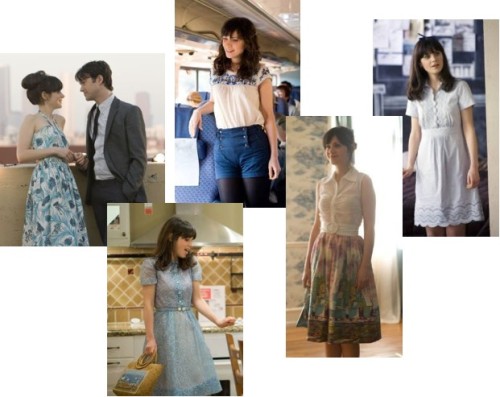#beauty myth
I just noticed how much of Zooey Deschanel’s wardrobe in 500 Days of Summer is very 50s housewife. Or, if you want to be trendy about it, “1950s chic.”
Subliminal messages about gender roles, anyone?
Post link
I started wearing makeup when I was 15, surreptitiously sneaking into the bathroom to apply lipstick between classes. At sixteen, I coloured my hair for the first time, lured by the promises laid out by Jessica and Elizabeth Wakefield, Cher from Clueless, Sandy from Grease and the lyrics of Blondie’s “Platinum Blonde.”

At 20, I had my head held over a toilet bowl and a Britney Spears poster on my wall for “thinspiration.”
Beauty, as I experienced it, was a cultivated mirage: an attempt to trick people into thinking I was better than I believed I was. It was a pursuit of a white-supremacist, fat-phobic, gender-normative ideal so elusive and impossible that even white, cisgendered women could aspire to be nothing more than second-rate facsimiles of it. In her classic work The Beauty Myth, author Naomi Wolf calls this ideal “the Iron Maiden,” named after a medieval German casket which was painted like a beautiful young woman on the outside, but served to torture and suffocate the person on the inside.
As a young woman, Wolf’s work resonated deeply with me – so much so, in fact, that basically I named my own book after hers. In my worst moments, The Beauty Myth was a book I carried close to my heart; a book that proved that my feelings and experiences weren’t unique to me. That they were a product of a bigger, toxic culture – which taught us that the most important thing a woman can be is beautiful, and that “beauty” is achieved by looking one, particular way.
Lately, though, I’ve felt like that culture is starting to change. Sure, you’ve got selfie culture, Instagram filters, thigh gaps and pornified vulvas… but the images of beauty I see – in magazines and on the internet – aren’t the identikit skinny blondes I grew up with (or the even more identikit skinny blondes I wrote about for women’s mags as a baby journalist).
It’s Amandla Stenberg covering Teen Vogue with natural hair, and Refinery29’s campaign to Take Back the Beach. It’s my friend Jacob rocking bright pink lipstick, an evening gown and stubble, and the girl in my dance class who looks herself in the eye when she moves, as though she not just believes but knows she is beautiful. It’s the staff at Sephora who tell you not that you “need” X, Y or Z to look presentable, but who show you ways to enhance what you already have.

In this new environment, beauty is starting to feel less and less like conforming to a particular standard (or a particular set of standards), and more and more like knowingyourself; like finding the aesthetic that makes you feel good, perfecting it, and holding your head high as you take it out into the world.
But I am conscious that what I see is not necessarily what is. And that my shift in perception may not reflect a shift in culture so much as my getting older, and the way I engage with beauty being less about winning the approval of others (or to put it more bluntly, finding a sex partner) and more about self-expression.
So I’m throwing it out to you for your feedback. Is beauty a burden for you? Is work you feel like you have to do, an external standard you compare yourself to? Is it a thing of self-expression, experimentation and play? A combination of the two? Something else altogether?
Write me back ([email protected]) and let me know what you think.

